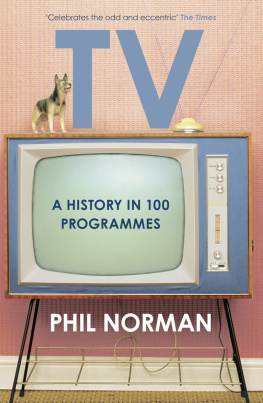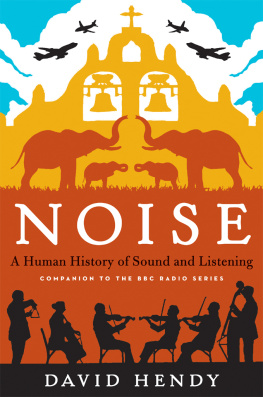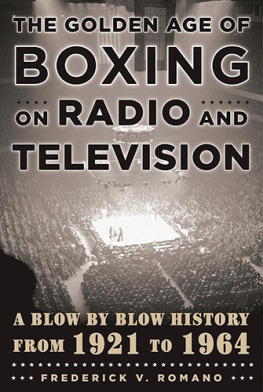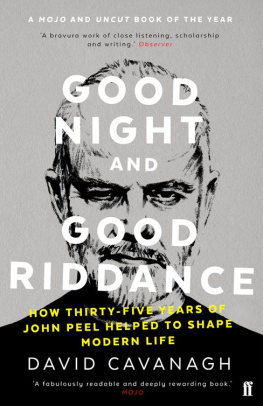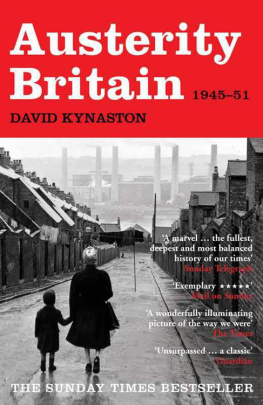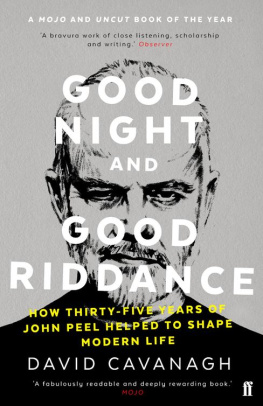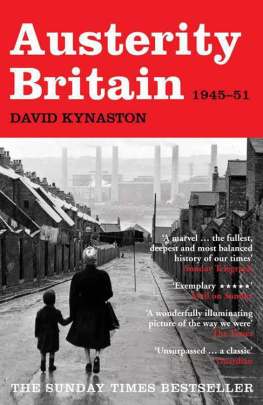ACKNOWLEDGEMENTS
It takes a village, they say. And, truly, Im in awe of just how many people there are to thank for helping to get The BBC: A Peoples History into the world.
First, and foremost, I owe this books very existence to my agent Caroline Dawnay and her team at United Agents, as well as to Andrew Franklin, Penny Daniel, Cecily Gayford, Susanne Hillen, and everyone else involved at my publishers, Profile Books. Theyve all been a model of professionalism, support and endless patience. I must also thank Charles Drazin, who offered timely assistance in reducing what was once a much larger book to its present size.
This is an authorised history of the BBC, and I should explain briefly what that means. One thing it doesnt mean is any right of editorial control by the Corporation. At no point have I been told what to say or what not to say: Ive had a totally free hand, and, for good or bad, this is my version of the BBC story, not an officially approved one. What being authorised has meant is simply this: several years of invaluable help from the BBC accessing and navigating my way through its archival treasures including not just its written documents and programme recordings, but also, in my case, getting unrivalled access to the Corporations Oral History Collection. I therefore have to thank, above all, Robert Seatter and John Escolme in the Secretarys office, who made this access possible and who offered help on a continuous basis, often at short notice and often at unearthly hours. I also want to offer profuse thanks to: James Codd, Louise North, Matthew Chipping and Jeff Walden at the Written Archives Centre; Luke OShea, Tadege Bay and James Edwards, who spared no effort in tracking down and preparing images from the Corporations vast picture library; and the staff of Radio 3 who supplied archive recordings for various programmes I made for them between 2014 and 2016.
Research in the early stages of this book was assisted by the award in 200809 of a Visiting Fellowship at the Centre for Research in the Arts, Social Sciences and Humanities (CRASSH) at the University of Cambridge; the Marjorie G. Wynne Fellowship in British Literature at the Beinecke Rare Book and Manuscript Library, Yale University; and an Everett Helm Visiting Fellowship at the Lilly Library, Indiana University, Bloomington. I also benefited from invitations to present findings at Macquarie University in Sydney; the National University of Ireland in Galway; the Charles III University of Madrid; the universities of Bamberg, Bergen, Bonn, Siena, Lund, Aarhus, Copenhagen, Westminster, St Andrews, and Aberystwyth; and at Roma Tre and RAI in Rome; the Prix Italia in Turin; the Australian Media Traditions Conference in Canberra; Wolfson College in Cambridge; the Beinecke Rare Book and Manuscript Library at Yale; the Royal College of Music in London; the European Communication Research and Education Association; the 20s30s Group; the Cambridge Centenary Authors Seminar; the Transnational Radio Encounters group in Berlin; and the Keep in Brighton. Speculative early versions of several chapters have appeared in other forms in the Cambridge Literary Review and in a number of BBC Radio 3 programmes, namely The Essay, the Sunday Feature: Langston Hughes at the Third, and Power of Three.
From 2016, the task of gathering together many of the personal recollections referred to in this book was boosted by the award, first of a University of Sussex Research Development Fund, and then of a substantial grant from the Arts and Humanities Research Council to support what became the Connected Histories of the BBC project. The core Connected Histories team who worked with me for the past five years Alban Webb, Margaretta Jolly, Tim Hitchcock, Ben Jackson, Anna-Maria Sichani and Denice Penrose were instrumental in making accessible the BBCs oral history recordings, creating new interview recordings, and identifying a multitude of associated archival documents. Theyve shared with me all the pains and all the joys of running a big research project, and have been a vital part of this whole process. The project pulled into its orbit a long list of other contributors and helpers, who also deserve thanks: John Hughes, Mathilde Davidson, Catalina Balan, Louisa Streeting, Josh Harris, Naresh Bedi, Jeannine Baker, Kate Murphy, Jamie Medhurst, Lucy Robinson, Helen Wood, Jilly Boyce Kay, James Procter, Aasiya Lodhi, Emma Sandon, Kate Terkanian, Sejal Sutaria, David Butler, Will Studdert, Hans-Ulrich Wagner, Samira Ahmed, Martha Kearney, Jenni Murray, Lyse Doucet, Nicholas Witchell, and Sue Inglish. Connected Histories of the BBC worked with several key partners: Mass Observation, for which thanks are due to Fiona Courage at the University of Sussex Library Special Collections; the Science Museum Group, for which thanks are due to Tim Boon as well as Elinor Groom at the National Science and Media Museum in Bradford; and the British Entertainment History Project, for which thanks are due to Mike Dick and Sue Malden. Our key partner was the BBC, for which thanks are due not just to Robert Seatter and John Escolme, but also Bill Thompson, Rob Cooper and their team at BBC Research and Development.
The Connected Histories of the BBC project allowed me, and others on the core team, to interview several people who have played an important role in recent broadcasting history, and whose accounts have informed this book: Tony Blackburn, Annie Nightingale, Johnny Beerling, Mike Phillips, Mark Tully, Satish Jacob, Elisabeth Robson Elliot, Peter Udell, Eugeniusz Smolar, Bridget Kendall, Lorna Clarke, Fi Glover, Joan Bakewell and Esther Rantzen. Im also grateful for communications and advice from Tony Ageh, Allan Little, Samira Ahmed and Robin Price.
Several formal acknowledgements are also due. BBC images, extracts from the BBCs Written Archives Centre, and quotations from the BBCs oral history collection are all BBC copyright and are reproduced with permission of the BBC. Extracts from Mass Observation are reproduced with permission of Curtis Brown Group Ltd, London on behalf of The Trustees of the Mass Observation Archive The Trustees of the Mass Observation Archive. Passages by Langston Hughes from the Langston Hughes Papers in the James Weldon Johnson Collection of the Yale Collection of American Literature, Beinecke Rare Book and Manuscript Library, and from the Bridson Manuscripts collection, Lilly Library, Indiana University, Bloomington, are reproduced with the permission of David Higham Associates Limited, London. Extracts from the Sieveking Manuscripts are published courtesy Lilly Library, Indiana University, Bloomington, Indiana, and, along with Lance Sievekings other writings at the BBC Written Archives Centre, are reproduced with the kind permission of his son, Paul Sieveking. Extracts from Douglas Ritchies unpublished memoir, V**** for Victory: The 1940 BBC Campaign against the Nazis, are reproduced with the kind permission of his son, Adam Ritchie. Extracts from my interview with Annie Nightingale CBE, D.Litt. are reproduced with the permission of the Curtis Brown Group Ltd, London on behalf of Annie Nightingale. Official records related to John Reith and Peter Eckersley held at The National Archives are Crown Copyright, and contain public sector information licensed under the Open Government Licence v3.0.
More personal thanks are due to several friends, colleagues or fellow authors, who were kind enough to read early drafts of the book and provide incredibly valuable feedback. They include: Robert Gildea, Matt Houlbrook, Dan Todman, Alban Webb, John Wyver, Jamie Medhurst, Anthony McNicholas, Robin Price, Tony Ageh and Allan Little. Theyve all saved me from error: any mistakes that remain are now mine alone.
The second half of this book was written during a global pandemic, and for much of the past eighteen months friends and colleagues have responded heroically to my own Long Covid by lifting from my shoulders some of my normal university duties and offering far more moral and practical support than Ive been entitled to expect. I owe special thanks to Alban Webb, Kate ORiordan, Pollyanna Ruiz, Dolores Tierney, Ben Highmore, Michael Bull, Kate Lacey, Lesley Model, Hope Wolf and Rachel OConnell. Really, I also owe it to everyone in the School of Media, Arts and Humanities at the University of Sussex: individually, and collectively, theyve made my academic home not just intellectually vibrant, but perhaps more importantly the kindest and friendliest of places to work. Given the malign political and financial climate within which British universities have been operating for the past decade, that is no mean achievement.


